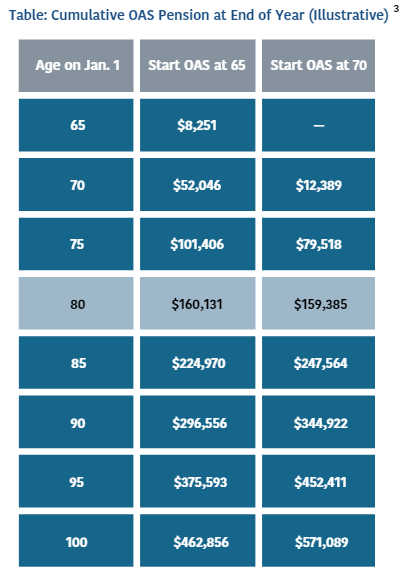Should I Delay My OAS Benefits?
August 8, 2023
Many high-net-worth investors do not require income from Old Age Security (OAS) benefits,
thus having the option to defer the start of payments. While the decision of when to take OAS benefits depends on many factors, including your income requirements, health status, life expectancy and tax planning, if you are in good health and have the opportunity to defer the start of OAS, what is the break-even age when deferring starts to pay off?
As a reminder, OAS benefits can start at age 65 and are based on how long you’ve resided in Canada after age 18 — generally, a 40-year requirement. OAS benefit rates are adjusted quarterly to account for increases in the cost of living. Starting July 1, 2022, an additional 10 percent is added to monthly benefits at age 75. As of January 1, 2023, the maximum monthly OAS benefits are $687.56 (ages 65 to 74) and $756.32 (ages 75 and older). OAS benefits are income tested, so if income is higher than $86,912 in 2023, you will have to repay part or the entire amount of OAS (at a clawback of 15 percent on income exceeding the threshold). 1 OAS payments can be deferred to age 70, resulting in an increased benefit of 0.6 percent for each month it is delayed past age 65.
A Case Study: Worth the Wait Why consider deferring payments? The following case study shows how the increased benefit for each month of delaying the start of OAS can accumulate and become significant over time:
Chris just turned 65 years old and has lived in Canada her entire life, entitling her to maximum OAS benefits. Her income is less than $86,000, so she will not be subject to a clawback. She received a letter from Service Canada stating that OAS will begin in January 2023.
However, after a quick analysis, she decides that deferring OAS may be beneficial. Assuming a two percent inflation rate, she estimates how much she would collect if she waited until age 70.
What is the Break-Even Age? Chris sees that just after she reaches age 80, the pension growth will outpace the amount she would otherwise receive by starting at age 65 (chart). And, by age 90, she will have collected almost $50,000 more. While the break-even age is around 80 years, Chris is reminded that because she has already reached the age of 65, her life expectancy is around 86 years old (or 82 for males who have reached age 65). 2 It should be noted that in some cases, Service Canada will automatically enroll an individual for their OAS benefits, like Chris. In other circumstances, the individual must apply. The good news is that Chris is able to cancel and defer OAS benefits within six months of receiving the first payment, subject to repaying any amounts received. She requests this in writing. 3
In Chris’ case, due to her life expectancy and sufficient income, it makes sense to defer OAS benefits. Of course, each situation is different and the decision of when to begin OAS may involve many factors, including income requirements, current and future sources of income, life expectancy and others. As always, seek the support of a professional.
1. www.canada.ca/en/employment-social-development/programs/pensions/pension/statistics/2023-quarterly-january-march.html; 2. Average life expectancy increases with age: www150.statcan.gc.ca/t1/tbl1/en/tv.action?pid=1310013401; 3. https://www.canada.ca/en/services/benefits/publicpensions/cpp/old-age-security/while-receiving.html
As a reminder, OAS benefits can start at age 65 and are based on how long you’ve resided in Canada after age 18 — generally, a 40-year requirement. OAS benefit rates are adjusted quarterly to account for increases in the cost of living. Starting July 1, 2022, an additional 10 percent is added to monthly benefits at age 75. As of January 1, 2023, the maximum monthly OAS benefits are $687.56 (ages 65 to 74) and $756.32 (ages 75 and older). OAS benefits are income tested, so if income is higher than $86,912 in 2023, you will have to repay part or the entire amount of OAS (at a clawback of 15 percent on income exceeding the threshold). 1 OAS payments can be deferred to age 70, resulting in an increased benefit of 0.6 percent for each month it is delayed past age 65.
A Case Study: Worth the Wait Why consider deferring payments? The following case study shows how the increased benefit for each month of delaying the start of OAS can accumulate and become significant over time:
Chris just turned 65 years old and has lived in Canada her entire life, entitling her to maximum OAS benefits. Her income is less than $86,000, so she will not be subject to a clawback. She received a letter from Service Canada stating that OAS will begin in January 2023.
However, after a quick analysis, she decides that deferring OAS may be beneficial. Assuming a two percent inflation rate, she estimates how much she would collect if she waited until age 70.
What is the Break-Even Age? Chris sees that just after she reaches age 80, the pension growth will outpace the amount she would otherwise receive by starting at age 65 (chart). And, by age 90, she will have collected almost $50,000 more. While the break-even age is around 80 years, Chris is reminded that because she has already reached the age of 65, her life expectancy is around 86 years old (or 82 for males who have reached age 65). 2 It should be noted that in some cases, Service Canada will automatically enroll an individual for their OAS benefits, like Chris. In other circumstances, the individual must apply. The good news is that Chris is able to cancel and defer OAS benefits within six months of receiving the first payment, subject to repaying any amounts received. She requests this in writing. 3
In Chris’ case, due to her life expectancy and sufficient income, it makes sense to defer OAS benefits. Of course, each situation is different and the decision of when to begin OAS may involve many factors, including income requirements, current and future sources of income, life expectancy and others. As always, seek the support of a professional.
1. www.canada.ca/en/employment-social-development/programs/pensions/pension/statistics/2023-quarterly-january-march.html; 2. Average life expectancy increases with age: www150.statcan.gc.ca/t1/tbl1/en/tv.action?pid=1310013401; 3. https://www.canada.ca/en/services/benefits/publicpensions/cpp/old-age-security/while-receiving.html

*Based on an annualized monthly maximum pension of $687.56 on January 1, 2023. Assumes conservative inflation adjustment of 2% per year on the annualized monthly pension. Adjusts pension by 10% at age 75.
Note: this analysis assumes that any OAS pension funds received are not reinvested.
What if Circumstances Change? If you encounter a shortened life span, Service Canada may allow for retroactive payment of OAS. An individual who is above the age of 65 and has not yet applied for OAS may request an earlier effective OAS start date. Generally, retroactive payments will be available for up to a maximum of 11 months from the date that the application has been received. https://www.canada.ca/en/services/benefits/publicpensions/cpp/old-age-security/benefit-amount.html
If you have any questions, please contact your Echelon Advisory Team.
What if Circumstances Change? If you encounter a shortened life span, Service Canada may allow for retroactive payment of OAS. An individual who is above the age of 65 and has not yet applied for OAS may request an earlier effective OAS start date. Generally, retroactive payments will be available for up to a maximum of 11 months from the date that the application has been received. https://www.canada.ca/en/services/benefits/publicpensions/cpp/old-age-security/benefit-amount.html
If you have any questions, please contact your Echelon Advisory Team.
Disclaimers
Echelon Wealth Partners Inc. The opinions expressed in this report are the opinions of the author and readers should not assume they reflect the opinions or recommendations of Echelon Wealth Partners Inc. or its affiliates. Assumptions, opinions and estimates constitute the author's judgment as of the date of this material and are subject to change without notice. We do not warrant the completeness or accuracy of this material, and it should not be relied upon as such. Before acting on any recommendation, you should consider whether it is suitable for your particular circumstances and, if necessary, seek professional advice. Past performance is not indicative of future results. The comments contained herein are general in nature and are not intended to be, nor should be construed to be, legal or tax advice to any particular individual. Accordingly, individuals should consult their own legal or tax advisors for advice with respect to the tax consequences to them.
Echelon Wealth Partners Inc. The opinions expressed in this report are the opinions of the author and readers should not assume they reflect the opinions or recommendations of Echelon Wealth Partners Inc. or its affiliates. Assumptions, opinions and estimates constitute the author's judgment as of the date of this material and are subject to change without notice. We do not warrant the completeness or accuracy of this material, and it should not be relied upon as such. Before acting on any recommendation, you should consider whether it is suitable for your particular circumstances and, if necessary, seek professional advice. Past performance is not indicative of future results. The comments contained herein are general in nature and are not intended to be, nor should be construed to be, legal or tax advice to any particular individual. Accordingly, individuals should consult their own legal or tax advisors for advice with respect to the tax consequences to them.




